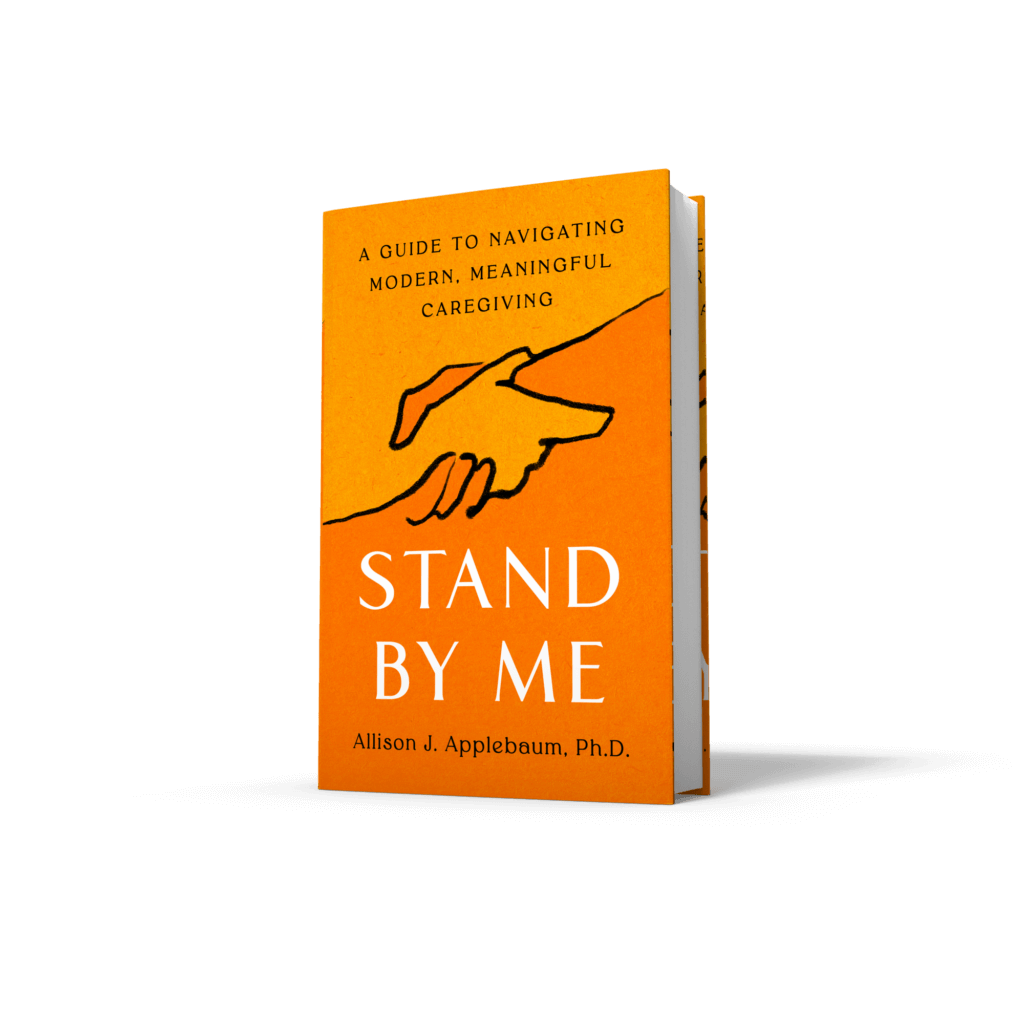Some experiences shape our careers in ways we continually return to, guiding our professional journeys. In healthcare and its allied fields, including marketing, it is often patients who reshape our paths—not through words, but through their responses to care, adherence to treatment, and ultimately, their health outcomes.
As a young clinical psychologist working with patients with cancer at the end of life in psycho-oncology, Dr. Allison Applebaum made a striking observation—one that would define her career. Her patients, rather than focusing on their own mortality, were deeply concerned about the people waiting anxiously in hospital corridors and managing care at home. These were the unseen members of the healthcare team—the family caregivers.
As she recalls: “I was working primarily with patients at the end of their lives, and what was striking to me was that rather than focusing on their own mortality, they were thinking about their parents, their partners, children, siblings, and friends. They were focused on the individuals in the waiting rooms and at home, who they identified as the centerpiece of their care.”
This realization set Dr. Applebaum on a path to transform how healthcare recognizes and supports caregivers. Since her postdoctoral fellowship at Memorial Sloan Kettering Cancer Center (MSK), she has dedicated her career to understanding the intersection of mental health and health outcomes—particularly in creating visibility and resources for caregivers. After founding the groundbreaking Caregivers Clinic at MSK in 2011, she recently joined Mount Sinai Health System as a professor of geriatrics and palliative medicine, expanding her work beyond oncology to address caregiver support across all chronic and life-limiting conditions.
Today, as healthcare increasingly moves into the home and treatment protocols grow more complex, caregivers play an even more essential role in patient outcomes. We spoke with Dr. Applebaum about what healthcare leaders must understand about caregivers—and the opportunities to better support this vital but often invisible workforce.

The Caregiver Paradox: Essential Yet Overlooked
Dr. Allison Applebaum first recognized the healthcare system’s deep reliance on caregivers in 2010. At the time, not a single cancer center in the United States had dedicated support services for them. When she founded the Caregivers Clinic at Memorial Sloan Kettering in 2011—the first of its kind—she encountered an unsettling hesitation from healthcare leadership.
“When I started this work, I was told that if you start to ask caregivers how they’re doing, if you actually screen for distress, what are you going to do about it when you find that everyone’s distressed? There was this between-the-lines message that it was better to not open Pandora’s box. That’s not the answer—we must open Pandora’s box and address what’s in there.”
More than a decade later, the challenge has only intensified as healthcare increasingly shifts toward the home.
“Healthcare is moving towards the home,” Dr. Applebaum explains. “More and more, medical protocols are being implemented at home that require family caregivers to carry out highly complex medical or nursing tasks—tasks that really should only be done by physicians and nurses. This is only going to continue and increase.”
This shift presents a paradox for healthcare systems. While they rely more than ever on caregivers to ensure treatment success, providing structured support raises questions of liability and responsibility. Yet failing to support caregivers introduces its own risks—to patient outcomes, treatment adherence, and ultimately, the success of new therapies and interventions.
The impact extends far beyond end-of-life care.
As Dr. Applebaum explains, “So much of the work I do is in supporting family caregivers who are not necessarily taking care of an individual under hospice care. These are caregivers trying to figure out how to navigate the healthcare system, how to get Medicaid, how to get medications, how to speak to physicians, how to take responsibility for case management. These responsibilities are vast and varied and increasing and for many, can last decades.”

Navigating Complex Systems
The challenges caregivers face extend beyond medical tasks. They must navigate complex healthcare systems, manage medications, coordinate care across providers, and handle legal and financial responsibilities. Dr. Applebaum outlines the comprehensive support needed:
“There’s a need for training in communication skills, helping caregivers navigate healthcare communication with both patients and members of the healthcare team. It’s helping them with problem-solving, navigating the complexities of our healthcare system, securing the information they need, training in medical and nursing tasks, guidance in financial and legal matters, and stepping into the role of power of attorney and healthcare proxy.”
When we think about support and treatment success, it goes beyond providing medicinal schedules and basic instructions. Healthcare systems face significant challenges in delivering comprehensive support. “We can do a much better job preparing families for facing medical care,” Dr. Applebaum explains. “I don’t mean just blood family—I mean chosen families as well. Some of the challenges come from staffing shortages and the fact that we are a dramatically overburdened healthcare system. One of the ways we can address these issues is having healthcare teams designate a caregiver champion—a nurse or social worker who can be the point person, available to answer questions, provide information and training, and triage caregivers to other levels of care as needed.”
What This Means for Marketers and Brands

This shift doesn’t just impact healthcare systems—it also reshapes how brands, marketers, and patient education strategies function at the Point of Care. With caregivers assuming a central role in treatment adherence, the opportunity to provide meaningful, practical support has never been greater.
While healthcare systems work to implement structural solutions like caregiver champions, Point of Care marketing can help bridge critical gaps in caregiver support. As Dr. Applebaum’s research demonstrates, the business case for supporting caregivers is compelling:
“There’s a growing body of literature showing that the presence of a well-supported, educated, trained caregiver can make the difference between life and death. When a caregiver is available to assist, that translates into fewer hospitalizations, lower readmissions, fewer ER visits, and earlier intervention before medical problems become crises. The data also shows that when caregivers are doing better emotionally, so are our patients—there are dramatic downstream benefits to both patient outcomes and the healthcare system when we support caregivers.”
Point of Care marketing—whether through in-office materials, digital tools, or provider-endorsed resources—offers a direct line of communication with caregivers at critical moments of engagement. Brands that provide meaningful, actionable support in these spaces can enhance treatment success by equipping caregivers with the right information, tools, and emotional reinforcement. Key opportunities include:
- Educational Content – Clear, digestible guidance on treatment protocols and medication adherence, particularly for the complex medical tasks caregivers increasingly manage at home. As Dr. Applebaum notes, caregivers need “training in communication skills, help navigating healthcare communication with both patients and members of the healthcare team, and guidance in managing medical and nursing tasks.”
- Navigation Support – Tools and resources that help caregivers coordinate care across providers, manage medications, and handle the financial and legal aspects of caregiving—addressing what Dr. Applebaum identifies as the “complexities of our healthcare system.”
- Mental Health Resources – Integration of caregiver mental health support into traditional healthcare materials and platforms, recognizing that caregiver emotional well-being directly impacts patient outcomes and leads to “dramatic downstream benefits to both patient outcomes and the healthcare system.”
- Community Connection – Facilitation of peer support networks that help reduce caregiver isolation and provide practical, experience-based guidance, acknowledging that caregiving challenges are “vast and varied” and often extend over long periods.
Opening this “Pandora’s box” of caregiver needs may seem daunting, but it represents a crucial opportunity for healthcare brands. As care continues to shift toward home settings, brands that effectively support caregivers position themselves as essential partners in treatment success. By integrating caregiver support into POC strategies, the industry can create more effective, holistic healthcare engagement that acknowledges and strengthens the full ecosystem of care.
Building Integrated Support
The impact of caregiver support extends far beyond individual relationships. Dr. Applebaum emphasizes that supporting one caregiver often strengthens entire care networks, particularly in cultures where caregiving responsibilities are shared across extended families:
“When you support that identified primary caregiver, you’re supporting the entire network of care and the entire family. There’s a ripple effect, especially in cases where there are multiple caregiving roles happening concurrently. It’s important to acknowledge that caregiving is culturally constructed, and the meaning of caregiving can be shaped by your own heritage.”
This ripple effect becomes particularly significant, according to Dr. Applebaum, in the “sandwich generation”—caregivers simultaneously managing care for aging parents while raising their own children. According to AARP, roughly 30 percent of family caregivers of older Americans lived in households that also included children or grandchildren in 2019. These caregivers are increasingly Gen Z and millennials who must balance caregiving with careers. (AARP 2023)
Understanding these complex family dynamics and cultural expectations isn’t just about sensitivity; it’s about creating more effective support systems that acknowledge and strengthen existing care networks. (AARP 2023)
Cultural Considerations and Family Networks
The impact of caregiver support extends far beyond individual relationships. Dr. Applebaum emphasizes that supporting one caregiver often strengthens entire care networks, particularly in cultures where caregiving responsibilities are shared across extended families:
“When you support that identified primary caregiver, you’re supporting the entire network of care and the entire family. There’s a ripple effect, especially in cases where there are multiple caregiving roles happening concurrently. It’s important to acknowledge that caregiving is culturally constructed, and the meaning of caregiving can be shaped by your own heritage.”
This ripple effect becomes particularly significant, according to Dr. Applebaum, in the “sandwich generation”—caregivers simultaneously managing care for aging parents while raising their own children. According to AARP, roughly 30 percent of family caregivers of older Americans lived in households that also included children or grandchildren in 2019. These caregivers are increasingly Gen Z and millennials who must balance caregiving with careers. (AARP 2023)
Understanding these complex family dynamics and cultural expectations isn’t just about sensitivity; it’s about creating more effective support systems that acknowledge and strengthen existing care networks. (AARP 2023)
The Role of POC Marketing in Strengthening Support
As aging populations grow, home care expands, and care responsibilities become more complex, healthcare marketers have an opportunity to bridge critical gaps in support. The Point of Care (POC) channel—particularly through digital tools, electronic health records (EHRs), and in-office materials—can serve as a vital connection point for caregivers, nurses, and care teams.
By integrating caregiver-focused messaging into these high-engagement environments, brands can play a role in improving long-term adherence, patient outcomes, and overall caregiver well-being. Opportunities include:
- Leveraging EHRs and HCP Portals – Ensuring that provider-endorsed caregiver resources are embedded within digital platforms that nurses and care teams use daily. These systems should accommodate different family structures and cultural approaches to caregiving, allowing for multiple caregivers to be recognized and supported.
- Enhancing Digital POC Touchpoints – Utilizing telehealth platforms, patient portals, and mobile apps to provide accessible, caregiver-focused education and support tools. Materials should be available in multiple languages and acknowledge different cultural approaches to healthcare decision-making and family involvement.
- Optimizing In-Person POC Engagement – Developing materials that acknowledge caregivers as key healthcare participants, equipping them with information to navigate complex treatment regimens. Resources should recognize and support diverse family structures and cultural caregiving traditions.
- Extending Support Beyond the Office – Creating omnichannel strategies that ensure caregivers continue to receive guidance and reinforcement through follow-up digital engagement, pharmacy programs, or community-based initiatives. This includes partnering with cultural organizations and community groups that already serve as trusted resources for different populations.
With caregivers taking on an increasing share of healthcare responsibilities, recognizing and supporting their role is no longer optional—it’s essential. For brands, integrating culturally responsive caregiver support into POC strategies isn’t just about engagement; it’s about improving healthcare outcomes at every stage of the patient journey by meeting caregivers where they are, with the resources they need, in ways that respect and strengthen their existing care networks.

A Vision for the Future
Looking ahead, Dr. Applebaum envisions continuing her role in championing comprehensive change, starting at the foundation of medical education:
“I hope for the next decade to see change within graduate medical education, where every medical student will have a course on family caregiving. It will be part of how they understand healthcare, so that when they finally sit with patients and families, they recognize that the caregiver is a critical member of the healthcare team and not somebody they should be ignoring.”
There are already signs of progress. “In the 15 years that I’ve done this work, I am noticing greater acceptance among my medical colleagues of the importance of family caregivers, and a desire to understand how they can help and support them.”
To support this evolution and make caregiver resources more widely accessible, Dr. Applebaum has published Stand By Me: A Guide to Navigating Modern, Meaningful Caregiving, which she describes as “a cliff notes version of the training, education, support, and guidance that a caregiver would get should they come to the caregivers clinic at Sloan Kettering,” making this knowledge available to all of the 53 million caregivers in the United States.
For healthcare marketers and life sciences brands, supporting caregivers isn’t just an ethical imperative—it’s a strategic necessity. By embedding caregiver-focused resources into Point of Care channels, brands can play a crucial role in improving adherence, reducing hospitalizations, and driving better outcomes for both patients and the healthcare system at large. As treatment protocols become more complex and care continues to shift toward home settings, the success of new therapies and interventions will increasingly depend on well-supported, well-trained caregivers.
Biography
Dr. Allison Applebaum is a caregiving scientist, writer, researcher, speaker, and advocate. She is a Professor of Geriatrics and Palliative Medicine and the Director of the Center for Caregiving at the Icahn School of Medicine at Mount Sinai. She was previously the Founding Director of the Caregivers Clinic at Memorial Sloan Kettering Cancer Center, the first program of its kind in the United States to provide comprehensive psychosocial care to family members and friends of patients who are in the caregiving role. Dr. Applebaum’s program of research focuses on the development and dissemination of supportive services for family caregivers. She has published over 100 articles, reviews, and book chapters on these topics, and is the editor of the textbook Cancer Caregivers (Oxford University Press, 2019). Dr. Applebaum has received competitive funding for her research, including awards from the National Cancer Institute, the National Institute of Nursing Research, and the American Cancer Society. She is also the author of the recently published narrative nonfiction book, Stand By Me: A Guide to Navigating Modern, Meaningful Caregiving (Simon Element, 2024).

